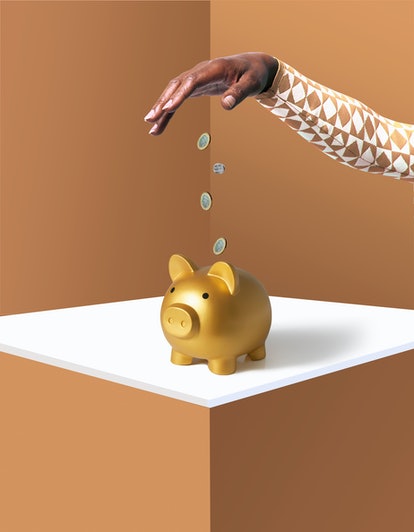Sometimes when I read financial planning advice, I feel like I’m reading tips for people who live on another planet. In some ways, I am. Queer people generally have different life experiences and family dynamics than our cis-het counterparts, which means that we also have financial needs that often aren’t addressed in the mainstream money media. So I asked trusted financial advisors to explain how LGBTQ+ people can get educated about financial planning that addresses our unique needs.
“As a gay financial planner, I have seen it all,” says David Rae, a certified financial planner in Palm Springs. Rae says the financial obstacles that queer people face are unique and they start adding up early in life. Some people, he explains, end up playing catch up financially years after being kicked out of their homes by parents when they come out or end up paying giant mental health care bills as a result of staying in the closet. So, in some sense, a lot of queer individuals start out with financial disadvantage.
Unfortunately, it doesn’t always get easier for queer adults. “Most of us in the queer community has gravitated towards high cost metropolitan areas because they are the most accepting and progressive,” says Jennifer Dazols, a financial planner in San Francisco. Living in pricier places can be a challenge for long term affordability and queer individuals often face a long list of extra costs that many cis-het people don’t have to think about. “The LGBT community has high medical costs in areas such as transgender health care, cost for HIV/AIDS treatment, and fertility treatment,” she says.
All of these factors mean that life often just costs more for queer people. And for some of us — it me — it takes a while to get financially organized. “As a group, we are less likely to be married or have kids, which are often typical milestones that prompt people to get serious about their money,” says Rae. “Without these or guidance from help family members, many in the queer community ignore their finances for way to long.”
Dazols adds that financial planning doesn’t get easier as queers move into their twilight years. “For LGBT elders, they may have had loss of income potential due to periods of unemployment due to HIV health or discrimination in the workplace,” she says. “The LGBT community often struggles with a safety net which stems from not having family support, not having children who can take care of them, or being cut off from generational wealth.” Basically, a lot of queer people are undermined, undervalued, and taken advantage of at every stage of life and have to work double time trying to catch up.
Look, I am not trying to say that all LGBTQ+ are poor and financially fucked, but it feels important to grapple with the complex reality of queer poverty — particularly amongst women, trans folx, and LGBTQ+ POC. Yes, there are some well off queer couples who enjoy having a double income without incurring the cost of having kids, but that stereotype is more of a myth than a statistical reality. And many experts fear that the myth of queer affluence is actually a stumbling block to achieving true equality. The reality is that even queer people who do well for themselves face the additional costs of being queer, so yes, we really do have to do financial planning differently.
Luckily, one of the things that queer people do really well is build community networks to support each other, and we can use those same skills to improve our queer economic outlook. “Our strength has always been the ability to community organize and advocate,” Dazols says. “We definitely need more financial literacy programs in our NGOs and community centers. We need to build mentorship programs and diversity & inclusion groups in our businesses.”
Dazols thinks that we’re going to have to fight for systemic change to secure a more stable future for all LGBTQ+ people. “We need to fight to set aside public funds to take care of the aging LGBT population, many of whom lived through the AIDS epidemic and missed years of income potential,” Dazols explains. “This generation has little safety net due to homophobia and they didn’t have access to medical fertility treatment to raise children. It’s important to strengthen intergenerational relationships within the LGBT community so that we can take care of our elders.”
On a personal level, if your a queer who’s been putting off dealing with your money issues, it’s time to get started. “Even if you are starting with super small steps, the important thing is to get started,” says Rae. He recommends starting with savings. “Try to save enough into your 401(k) — if you have one — to get the full match; it is like free money,” he explains. Then focus on consumer debt and try to make deals with your creditors and student loan companies. From there, Rae says, try to build up an emergency fund so that someday you, too, can retire into the American dream we were all promised.
For many queer people, becoming financially literate means finding queer individuals to support us in our unique predicament. Dazols recommends hiring queer financial advisors and checking out some queer-specific financial resources, like Queer Money, a podcast about, well, queer people and money. Rae adds that there’s no need to feel ashamed if you feel financially behind and need help. “Don’t feel bad if you don’t know all of this financial stuff, you are not alone,” Rae says.







